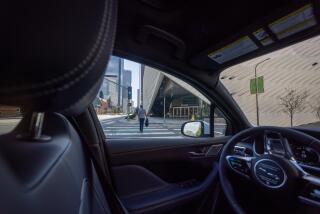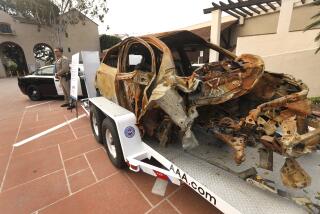Have or Hold: an Even Call
- Share via
The driving performance of those using cell phones drops significantly, regardless of whether they are using hands-free devices, according to a new safety study released Thursday.
The study, conducted by University of Utah researchers and released by the National Safety Council, contradicts conventional wisdom that headsets and hands-free phones are safer than hand-held cell phones.
Many states are considering legislation to require drivers to use hands-free phone devices when making calls. New York recently became the first state to pass such a law.
“All of the laws that have been proposed or enacted, they all make the assumption that it’s holding the phone that is the problem,” said David Strayer, a psychology professor and the lead author of the study. “Now the research community is coming out and saying, no, it’s not just that. You are impaired to dangerous levels when you are just conversing on the telephone.”
The bottom line of the new study: “People were four times more likely to get in an accident using a hands-free device,” Strayer said, adding that the probability is the same for hand-held cell phones.
That finding puts wireless phone companies in a tough spot because, according to one study, their customers do as much as 60% of their cell phone talking while in a car. For the companies, the cell phone bans with hands-free exceptions have represented a livable compromise, especially because it had the side benefit of boosting the sales of headsets, voice-dialing options and other products.
Verizon Wireless, Sprint PCS and others, for example, typically offer customers a $5 discount on the purchase of a hands-free device and give out pamphlets on safe driving with their phones. Sprint PCS also is planning a seminar for employers concerned about the risk and liability of having employees use cell phones while on the road.
The industry’s primary trade group, the Cellular Telecommunications and Internet Assn., has for years been issuing safe-driving tips. But it also has lobbied mightily against the growing wave of bans on cell phone use in cars.
In response to the Utah study, the association reiterated its safe-driving tips and argued that “any activity a driver engages in, besides the task of driving, has the potential to distract. . . . Therefore, we must remind drivers that their primary responsibility is to drive safely.”
The association often argues that cell phone use is just one of a long list of driver distractions, including putting on makeup, shaving, drinking coffee and changing a compact disc.
But the study found cell phone use significantly more distracting than other in-car activities.
The initial phase of the Utah study included 64 undergraduate participants whose driving skills were tested as they talked on a cell phone, tuned a radio and listened to a book on tape.
Each person’s driving performance was measured using a computer-simulated driving scene that tested reaction times to traffic lights and so forth. The study, which was completed two years ago, used joystick controls and a “brake button” instead of the actual car controls.
Since then, further studies using elaborate car simulators (which have real brake pedals and steering wheels) have reaffirmed the earlier findings, Strayer said. The complete study will be published in the journal Psychological Science.
“Almost everybody has some personal experience of being on the road with some bozo who was driving and using a cell phone and they almost got them into an accident,” Strayer said.
The problem is that “if you ask most people, they will say they are not impaired while they’re driving . . . everyone else is impaired.”






